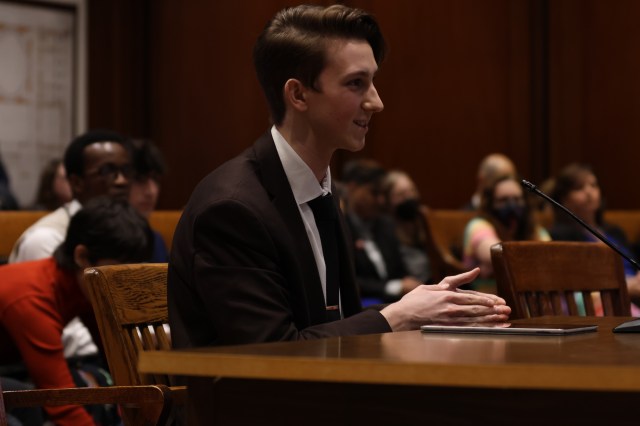Pushing for Financial Literacy Education
BOSTON — A UMass Lowell student and Billerica native is championing a bill that would require Massachusetts high schools to incorporate personal financial literacy into their curriculum. The bill, titled “An Act Relative to Personal Financial Literacy,” was introduced by state Rep. Ryan Hamilton of Methuen last fall. Its goal is to ensure that students in Massachusetts receive essential financial education before entering college and adulthood.
Addressing the Financial Literacy Gap
“The lack of financial literacy among many people is shocking,” said Sean Simonini, a UMass Lowell student and founder of the Massachusetts Association of Student Representatives. Simonini, who served as the student representative on the Billerica School Committee until his 2022 graduation, is part of a group advocating for this bill to reach Gov. Maura Healey’s desk. Currently, only 17 school districts in Massachusetts, including Billerica, require financial literacy courses for graduation.
The bill’s significance is heightened by the current economic climate and the high costs of housing and education. “Teachers once explained to me what a $100,000 student loan looks like over time,” Simonini recalled. “The financial consequences of young people signing such large loan agreements can be devastating.”
Supporting Underserved Communities
If enacted, the bill would establish a Financial Literacy Trust Fund managed by the state Department of Elementary and Secondary Education. This fund would prioritize underserved communities where students are less likely to receive adequate financial education. It would finance professional development, the purchase and use of educational resources, and partnerships with higher education institutions.
“The trust fund will provide financial support to districts, especially benefiting students from homes without significant financial resources,” Simonini explained. On January 10, Simonini and about 40 others, including student representative association members, testified in favor of the bill at the State House. The Joint Committee on Education will report on the bill by February 7, which could include recommendations for further study or a favorable or unfavorable decision.
Building on Previous Legislation
This bill builds on a 2019 law signed by former Gov. Charlie Baker, which set standards for financial literacy education in Massachusetts schools. “Far too many of our young people enter adulthood with limited financial education,” stated Hamilton. “With rising college costs and living expenses, finding a stable job and housing is increasingly difficult. I introduced H.4199 because our communities, including those in the Merrimack Valley, need better financial literacy education.”
State Rep. Rodney Elliott of Lowell, a co-sponsor of the bill, noted that other states already have similar requirements. “Teaching personal finance is crucial to ensuring students can manage their money effectively,” said Elliott. “Financial literacy educates students about responsible spending before they face significant debt from credit cards.”
Combating Wealth Inequality
Simonini believes the bill will help combat wealth inequality by equipping students with the knowledge necessary for financial success. “Students across Massachusetts are rallying behind this bill, recognizing the importance of financial skills amidst skyrocketing tuition rates and living costs,” Simonini stated. “By making every student financially literate, we can close knowledge gaps that contribute to wealth inequality and build a more prosperous Commonwealth.”
The bill also aims to expand experiential learning opportunities in financial literacy. This includes hands-on activities and interactions with financial experts on topics like budgeting, saving, investing, and loans.

